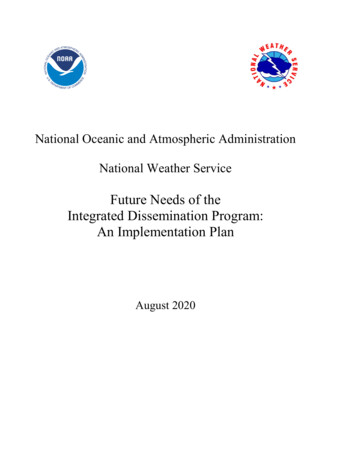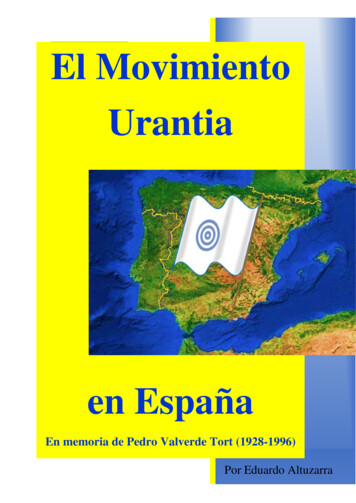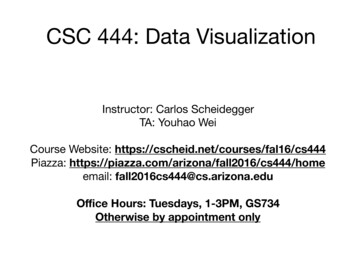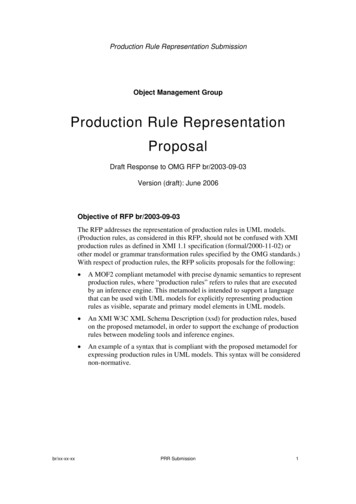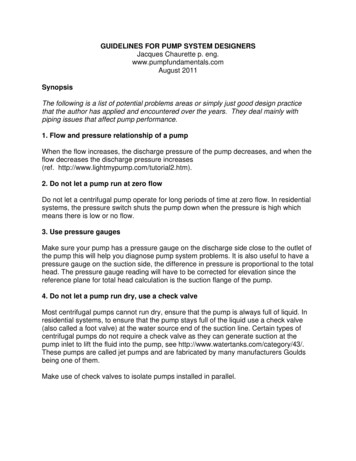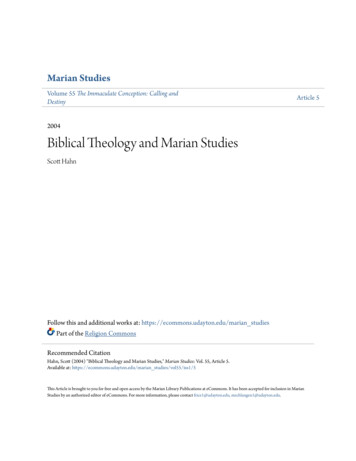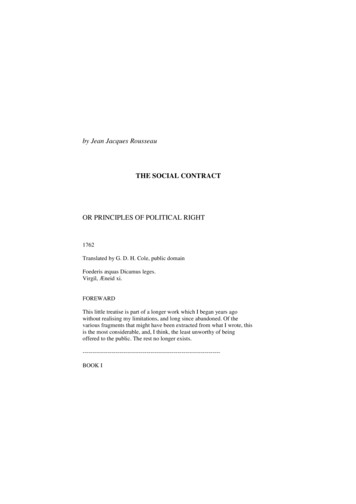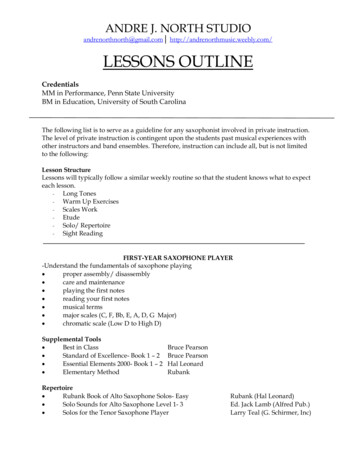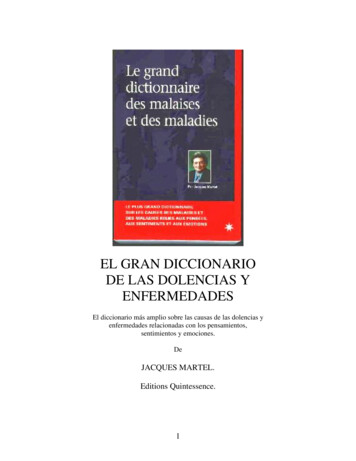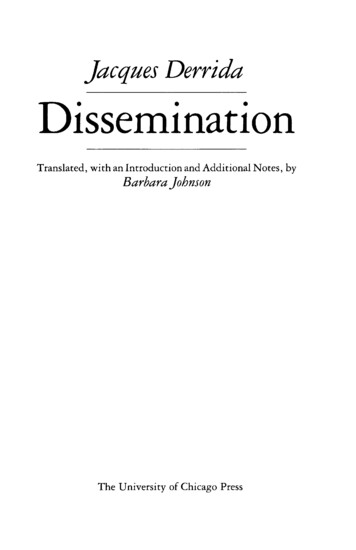
Transcription
Jacques DerridaDisseminationTranslated, with an Introduction and Additional Notes, byBarbara JohnsonThe University of Chicago Press
ContentsTranslator's IntroductionVlIOutwork, prefacing1.2.3.4.5.Plato's Pharmacy61I65PharmaciaThe Father of LogosThe Filial Inscription: Theuth, Hermes, Thoth, Nabfr, NeboThe PharmakonThe 'pharmakeusII6.7.8.9.1The PharmakosThe Ingredients: Phantasms, Festivals, and PaintsThe Heritage of the Pharmakon: Family ScenePlay: From the Pharmakon to the Letter and fromBlindness to the Supplement65758495117lW128134142156The Double Session173I175II227
VICONTENTSDissemination287I2891. The TriggerThe Apparatus or FrameThe ScissionThe Double Bottom of the PlupresentwriTing, encAsIng, screeNingThe Attending Discourse2.3.4.5.6.290296300306313324II33010. Grafts, a Return to OvercastingXI. The Supernumerary3303403473553597. The Time before First8. The Column9. The Crossroads of the "Est"
Translator's IntroductionAll translation is only a somewhat provisional way of coming toterms with the foreignness of languages.-Walter Benjamin, "The Task of the Translator"What is translation? On a platterA poet's pale and glaring head,A parrot's screech, a monkey's chatter,And profanation of the dead.-Vladimir Nabokov, "On Translating 'Eugene Onegin'"Jacques Derrida, born in Algiers in 1930, teaches philosophy at the EcoleNormale Superieure in Paris. His tremendous impact on contemporarytheoretical thought began in 1967 with the simultaneous publication ofthree major philosophical works: La Voix et Ie phenomene (an introduction tothe problem of the sign in Hussed's phenomenology; translated by DavidAllison as Speech and Phenomena {Evanston: Northwestern University Press,1973 }), L' ecriture et la difference (a collection of essays on the problematics ofwriting in literature, philosophy, psychoanalysis, and anthropology; translated by Alan Bass as Writing and Difference {Chicago: University of ChicagoPress, 1978}), and De la grammatologie (a sustained analysis of the repressionof writing in Western theories of language and culture and a methodological and theoretical outline of a new "science" of writing; translated byGayatri Chakravorty Spivak as OfGrammatology {Baltimore: Johns HopkinsUniversity Press, 1974}).Five years later, in 1972, came another tripartite Derridean biblioblitz:Positions (a collection of interviews; translated by Alan Bass as Positions{Chicago: University of Chicago Press, 1981}), Marges: de la philosophie (acollection of essays inion the "margins" of philosophy, linguistics, andliterature {translation in preparation, University of Chicago Press}), and LaDissemination.Vll
Vl11TRANSLATOR'S INTRODUCTIONSince 1972, Derrida's work has continued to proliferate and diversify.Glas (a giant montage of textual grafts and hardworking wordplays inwhich Hegel and Genet are shuffled into each other from juxtaposedcolumns of print) appeared in 1974, followed, among numerous articlesand short works, by a collection of critical essays on painting, La Verite enpeinture (1978), and, in 1980, by La Carte Posta/e: de Socrate a Freud etau-de/a, an intriguing collection of essays that treat the psychoanalyticalwritings of Freud and Jacques Lacan, preceded by a pseudo-fictional,pseudo-autobiographical epistolary preface that hinges on a postcard depicting Plato dictating behind the back of a writing Socrates.I. A Critique of Western MetaphysicsBest known in this country for having forged the term "deconstruction,"Jacques Derrida follows Nietzsche and Heidegger in elaborating a critiqueof "Western metaphysics," by which he means not only the Westernphilosophical tradition but "everyday" thought and language as well.Western thought, says Derrida, has always been structured in terms ofdichotomies or polarities: good vs. evil, being vs. nothingness, presence vs.absence, truth vs. error, identity vs. difference, mind vs. matter, man vs.woman, soul vs. body, lifevs. death, naturevs. culture, speech vs. writing.These polar opposites do not, however, stand as independent and equalentities. The second term in each pair is considered the negative, corrupt,undesirable version of the first, a fall away from it. Hence, absence is thelack of presence, evil is the fall from good, error is a distortion of truth, etc.In other words, the two terms are not simply opposed in their meanings,but are arranged in a hierarchical order which gives the first term priority, inboth the temporal and the qualitative sense of the word. In general, whatthese hierarchical oppositions do is to privilege unity, identity, immediacy,and temporal and spatial presentness over distance, difference, dissimulation,and deferment. In its search for the answer to the question of Being,Western philosophy has indeed always determined Being as presence.Derrida's critique of Western metaphysics focuses on its privileging ofthe spoken word over the written word. The spoken word is given a highervalue because the speaker and listener are both present to the utterancesimultaneously. There is no temporal or spatial distance between speaker,speech, and listener, since the speaker hears himself speak at the samemoment the listener does. This immediacy seems to guarantee the notionthat in the spoken word we know what we mean, mean what we say, saywhat we mean, and know what we have said. Whether or not perfect
TRANSLATOR'S INTRODUCTIONIXunderstanding always occurs in fact, this image of perfectly self-presentmeaning is, according to Derrida, the underlying ideal of Western culture.Derrida has termed this belief in the self-presentation of meaning "Logocentrism," from the Greek word Logos (meaning speech, logic, reason, theWord of God). W ri ting, on the other hand, is considered by the logocentricsystem to be only a representation of speech, a secondary substitute designedfor use only when speaking is impossible. Writing is thus a second-rateactivity that tries to overcome distance by making use of it: the writer putshis thought on paper, distancing it from himself, transforming it intosomething that can be read by someone far away, even after the writer'sdeath. This inclusion of death, distance, and difference is thought to be acorruption of the self-presence of meaning, to open meaning up to all formsof adulteration which immediacy would have prevented.In the course of his critique, Derrida does not simply reverse this valuesystem and say that writing is better than speech. Rather, he attempts toshow that the very possibility of opposing the two terms on the basis ofpresence vs. absence or immediacy vs. representation is an illusion, sincespeech is already structured by difference and distance as much as writing is.The very fact that a word is divided into a phonic signifier and a mentalsignified, and that, as Saussure pointed out, language is a system of differences rather than a collection of independently meaningful units, indicatesthat language as such is already constituted by the very distances anddifferences it seeks to overcome. To mean, in other words, is automaticallynot to be. As soon as there is meaning, there is difference. Derrida's word forthis lag inherent in any signifying act is differance, from the French verbdifferer, which means both "to differ" and "to defer." What Derridaattempts to demonstrate is that this differance inhabits the very core of whatappears to be immediate and present. Even in the seemingly nonlinguisticareas of the structures of consciousness and the unconscious, Derridaanalyzes the underlying necessity that induces Freud to compare the psychicapparatus to a structure of scriptural differance, a "mystic writing-pad. ",The illusion of the self-presence of meaning or of consciousness is thusproduced by the repression of the differential structures from which theyspring.Derrida's project in his early writings is to elaborate a science of writingcalled grammatology: a science that would study the effects of this differancewhich Western metaphysics has systematically repre sed in its search for1. See "Freud and the Scene of Writing," in Writing and Difference, trans. Alan Bass(Chicago: University of Chicago Press, 1978), pp. 196-231.
xTRANSLATOR'S INTRODUCTIONself-present Truth. But, as Derrida himself admits, the very notion of aperfectly adequate science or -logy belongs to the logocentric discourse whichthe science of writing would try, precisely, to put in question. Derrida thusfinds himself in the uncomfortable position of attempting to account for anerror by means of tools derived from that very error. For it is not possible toshow that the belief in truth is an error without implicitly believing in thenotion of Truth. By the same token, to show that the binary oppositions ofmetaphysics are illusions is also, and perhaps most importantly, to showthat such illusions cannot simply in turn be opposed without repeating thevery same illusion. The task of undoing the history oflogocentrism in orderto disinter differance would thus appear to be a doubly impossible one: onthe one hand, it can only be conducted by means of notions of revelation,representation, and rectification, which are the logocentric notions parexcellence, and, on the other hand, it can only dig up something that isreally nothing-a difference, a gap, an interval, a trace. How, then, cansuch a task be undertaken?II. Supplementary ReadingAny attempt to disentangle the weave of differance from the logocentricblanket can obviously not long remain on the level of abstmction andgenemlity of the preceding remarks. Derrida's writing, indeed, is alwaysexplicitly inscribed in the margins of some preexisting text. Derrida is, firstand foremost, a reader, a reader who constantly reflects on and transformsthe very nature of the act of reading. It would therefore perhaps be helpfulto examine some of the specific reading strategies he has worked out. I beginwith a chapter from Of Grammatology entitled "That Dangerous Supplement," in which Derrida elabomtes not only a particularly striking readingof Rousseau's Confessiom but also a concise reflection on his own methodology.Derrida's starting point is the rhetoric of Rousseau's discussions ofwriting, on the one hand, and masturbation, on the other. Both activitiesare called supplements to natuml intercourse, in the sense both of conversation and of copulation. What Derrida finds in Rousseau's account is acurious bifurcation within the values of writing and masturbation withrespect to the desire for presence.Let us take writing first. On the one hand, Rousseau condemns writingfor being only a representation of direct speech and therefore less desimblebecause less immediate. Rousseau, in this context, privileges speech as themore direct expression of the self. But on the other hand, in the actual
TRANSLATOR'S INTRODUCTION·Xlexperience of living speech, Rousseau finds that he expresses himself muchless successfully in person than he does in his writing. Because of hisshyness, he tends to blurt out things that represent him as the opposite ofwhat he thinks he is:I would love society like others, if I were not sure of showing myselfnot only at a disadvantage, but as completely different from what I am.The part that I have taken of writing and hiding myself is precisely theone that suits me. If! were present, one would never know what I wasworth.'It is thus absence that assures the presentation of truth, and presence thatentails its distortion. Derrida's summation of this contradictory stance is asfollows:Straining toward the reconstruction of presence, {Rousseau} valorizesand disqualifies writing at the same time . . . . Rousseau condemnswriting as destruction of presence and as disease of speech. He rehabilitates it to the extent that it promises the reappropriation of that ofwhich speech allowed itself to be dispossessed. But by what, if notalready a writing older than speech and already installed in that place?(Pp. 141-42)In other words, the loss of presence has always already begun. Speech itselfsprings out of an alienation or differance that has the very structure ofwriting.It would seem, though, that it is precisely through this assumption ofthe necessity of absence that Rousseau ultimately succeeds in reappropriating the lost presence. In sacrificing himself, he recuperates himself. Thisnotion that self-sacrifice is the road to self-redemption is a classical structurein Western metaphysics. Yet it can be shown that this project of reappropriation is inherently self-subverting because its very starting point is notpresence itself but the desire for presence, that is, the lack of presence. It isnot possible to desire that with which one coincides. The starting point isthus not a point but a differance:Without the possibility of differance, the desire of presence as suchwould not find its breathing-space. That means by the same token that2. Quoted in Of Grammatology (trans. Gayatri Chakravorty Spivak {Baltimore: JohnsHopkins University Press, 1974]), p. 142. Page numbers in brackets following references toOfGrammatology refer to J. M. Cohen's translation of Rousseau's Confersions (Penguin, 1954),which I have sometimes substituted for the translation used by Spivak.
xuTRANSLATOR'S INTRODUCTIONthis desire carries in itself the destiny of its nonsatisfaction. Differanceproduces what it forbids, making possible the very thing that it makesimpossible. (P. 143)The same paradoxical account of the desire for presence occurs in Rousseau's discussions of sexuality. On the one hand, masturbation is condemned as a means of "cheating Nature" and substituting a mere image(absence) for the presence of a sexual partner. On the other hand:This vice, which shame and timidity find so convenient, has a particular attraction for lively imaginations. It allows them to dispose, so tospeak, of the whole female sex at their will, and to make any beautywho tempts them serve their pleasure without the need of first obtaining her consent. (P. 151 [109})It is thus the woman's absence that gives immediacy to her imaginarypossession, while to deal with the woman's presence would inevitably be toconfront differance. Masturbation is both a symbolic form of ideal union,since in it the subject and object are truly one, and a radical alienation of theself from any contact with an other. The union that would perfectly fulfilldesire would also perfectly exclude the space of its very possibility.Just as speech was shown to be structured by the same differance aswriting, so, too, the desire to possess a "real" woman is grounded indistance, both because the prohibition of incest requires that one's loveobject always be a substitute for the original object, and because of thefundamental structure of desire itself. Rousseau's autobiography offers us aparticularly striking example of the essential role of differance in desire.Faced with the possibility of a quasi-incestuous relation with the woman hecalled "Mama"-incest being the very model of the elimination of differance--Rousseau finds that his desire manifests itself in inverse proportionto Mama's physical proximity: "I only felt the full strength of my attachment to her when she was out of my sight" (p. 152 [l07}). Not only doesthe enjoyment of presence appear to Rousseau to be impossible; it also couldbe fatal: "lfI had ever in my life tasted the delights oflove even once in theirplenitude," he writes, "I do not imagine that my frail existence would havebeen sufficient for them. I would have been dead in the act" (p. 155).Presence, then, is an ambiguous, even dangerous, ideal. Direct speech isself-violation; perfect heteroeroticism is death. Recourse to writing andautoeroticism is necessary to recapture a presence whose lack has not beenpreceded by any fullness. Yet these two compensatory activities are themselves condemned as unnecessary, even dangerous, supplements.
TRANSLATOR'S INTRODUCTIONXIllIn French, the word supplement has two meanings: it means both "anaddition" and "a substitute." Rousseau uses this word to describe bothwriting and masturbation. Thus, writing and masturbation may add tosomething that is already present, in which case they are superfluous, AND/ORthey may replace something that is not present, in which case they arenecessary. Superfluous and necessary, dangerous and redemptive, the supplement moves through Rousseau's text according to a very strange logic.What Derrida's reading of Rousseau sketches out is indeed nothing lessthan a revolution in the very logic of meaning. The logic of the supplementwrenches apart the neatness of the metaphysical binary oppositions. Insteadof "A is opposed to B" we have "B is both added to A and replaces A." A andB are no longer opposed, nor are they equivalent. Indeed, they are no longereven equivalent to themselves. They are their own differance from themselves. "Writing," for example, no longer means simply "words on a page,"but rather any differential trace structure, a structure that also inhabitsspeech. "Writing" and "speech" can therefore no longer be simplyopposed, but neither have they become identical. Rather, the very notion oftheir "identities" is put in question.In addition to this supplementary logic in the text's signified, the inseparability of the two senses of the word "supplement" renders any affirmationthat contains it problematic. While Rousseau's explicit intentions are tokeep the two senses rigorously distinct-to know when he means "substitute" and when he means "addition"-the shadow presence of the othermeaning is always there to undermine the distinction. On the level both ofthe signified and of the signifier, therefore, it is not possible to pin down thedividing lines between excess and lack, compensation and corruption. Thedoubleness of the word supplement carries the text's signifYing possibilitiesbeyond what could reasonably be attributed to Rousseau's conscious intentions. Derrida's reading shows how Rousseau's text functions agaimt itsown explicit (metaphysical) assertions, not just by creating ambiguity, butby inscribing a systematic "other message" behind or through what is beingsaid.III. DeconstructionLet us now examine more closely the strategies and assumptions involved inthis type of critical reading. It is clear that Derrida is not seeking the"meaning" of Rousseau's text in any traditional sense. Be neither adds thetext up into a final set of themes or affirmations nor looks for the reality ofRousseau's life outside the text. Indeed, says Derrida, there is no outside ofthe text:
XIVTRANSLATOR'S INTRODUCTION0/ the text [il n'y a pas de hors-texte}. And that isneither because Jean-Jacques' life, or the existence of Marna or Theresethemselves, is not of prime interest to us, nor because we have access totheir so-called "real" existence only in the text and we have neither anymeans of altering this, nor any right to neglect this limitation. Allreasons of this type would already be sufficient, to be sure, but there aremore radical reasons. What we have tried to show by following theguiding line of the "dangerous supplement," is that in what one callsthe real life of these existences "of flesh and bone," beyond and behindwhat one believes can be circumscribed as Rousseau's text, there hasnever been anything but writing; there have never been anything butsupplements, substitutive significations which could only come forthin a chain of differential references, the "real" supervening, and beingadded only while taking on meaning from a trace and from an invocation of the supplement, etc. And thus to infinity, for we have read, inthe text, that the absolute present, Nature, that which words like "realmother" name, have always already escaped, have never existed; thatwhat opens meaning and language is writing as the disappearance ofnatural presence. (Pp. 158-59; emphasis in original)There is nothing outsideFar from being a simple warning against the biographical or referentialfallacy, il n'y a pas de hors-texte is a statement derived from Rousseau'sautobiography itself. For what Rousseau's text tells us is that our veryrelation to "reality" already functions like a text. Rousseau's account of hislife is not only itself a text, but it is a text that speaks only about thetextuality of life. Rousseau's life does not become a text through his writing:it always already was one. Nothing, indeed, can be said to be not a text.Derrida's reading of Rousseau's autobiography thus proposes a "deconstruction" of its logocentric claims and metaphysical assumptions. Deconstruction is not a form of textual vandalism designed to prove that meaningis impossible. In fact, the word "de-construction" is closely related not tothe word "destruction" but to the word "analysis," which etymologicallymeans "to undo"-a virtual synonym for "to de-construct." The deconstruction of a text does not proceed by random doubt or generalizedskepticism, but by the careful teasing out of warring forces of significationwithin the text itself. If anything is destroyed in a deconstructive reading, it isnot meaning but the claim to unequivocal domination of one mode ofsignifying over another. This, of course, implies that a text signifies in morethan one way, and to varying degrees of explicitness. Sometimes thediscrepancy is produced, as here, by a double-edged word, which serves as ahinge that both articulates and breaks open the explicit statement being
TRANSLATOR'S INTRODUCTIONxvmade. Sometimes it is engendered when the figurative level of a statementis at odds with the literal level. And sometimes it occurs when the so-calledstarting point of an argument is based on presuppositions that render itsconclusions problematic or circular.Derrida defines his reading strategy as follows:The reading must always aim at a certain relationship, unperceived bythe writer, between what he commands and what he does not command of the patterns of the language that he uses. This relationship isnot a certain quantitative distribution of shadow and light, of weakness or of force, but a signifying structure that the critical readingshould produce. (p. 158; emphasis in original)In other words, the deconstructive reading does not point out the flaws orweaknesses or stupidities of an author, but the necessity with which what hedoes see is systematically related to what he does not see.It can thus be seen that deconstruction is a form of what has long beencalled a critique. A critique of any theoretical system is not an examination ofits flaws or imperfections. It is not a set of criticisms designed to make thesystem better. It is an analysis that focuses on the grounds of that system'spossibility. The critique reads backwards from what seems natural, obvious, self-evident, or universal, in order to show that these things havetheir history, their reasons for being the way they are, their effects on whatfollows from them, and that the starting point is not a (natural) given but a(cultural) construct, usually blind to itself. For example, Copernicus can besaid to have written a critique of the Ptolemeic conception of the universe.But the idea that the earth goes around the sun is not an improvement of theidea that the sun goes around the earth. It is a shift in perspective whichliterally makes the ground move. It is a deconstruction of the validity of thecommonsense perception of the obvious. In the same way, Marx's critiqueof political economy is not an improvement in it but a demonstration thatthe theory which starts with the commodity as the basic unit of economy isblind to what produces the commodity-namely, labor. Every theory startssomewhere; every critique exposes what that starting point conceals, andthereby displaces all the ideas that follow from it. The critique does not ask"what does this statement mean?" but "where is it being made from? Whatdoes it presuppose? Are its presuppositions compatible with, independentof, and anterior to the statement that seems to follow from them, or do theyalready follow from it, contradict it, or stand in a relation of mutualdependence such that neither can exist without positing that the other isprior to it?"
XVITRANSLATOR'S INTRODUCTIONIn its elaboration of a critique of the metaphysical forces that structureand smother differance in every text, a deconstructive reading thus assumes:1. That the rhetoric of an assertion is not necessarily compatible with itsexplicit meaning.2. That this incompatibility can be read as systematic and significant assuch.3. That an inquiry that attempts to study an object by means of that veryobject is open to certain analyzable aberrations (this pertains to virtually allimportant investigations: the self analyzing itself, man studying man,thought thinking about thought, language speaking about language, etc.).4. That certain levels of any rigorous text will engender a systematicdouble mark of the insistent but invisible contradiction or differance (therepression of) which is necessary for and in the text's very elaboration.But if the traditional logic of meaning as an unequivocal structure ofmastery is Western metaphysics, the deconstruction of metaphysics cannotsimply combat logocentric meaning by opposing some other meaning to it.Differance is not a "concept" or "idea" that is "truer" than presence. It canonly be a process of textual work, a strategy of writing.IV. Derrida's StylesEarly in "The Double Session," in the course of a discussion of the possibleHegelian or Platonic overtones of the word "Idea" in Mallarmf's writing,we read the following warning:But a reading here should no longer be carried out as a simple table ofconcepts or words, as a static or statistical sort of punctuation. Onemust reconstitute a chain in motion, the effects of a network and theplay of a syntax. (P. 194)This warning applies equally well to Derrida's own writing, in which it isall too tempting to focus on certain "key" terms and to compile them into astatic lexicon: supplement, dif!erance, pharmakon, hymen, etc. Because Derrida's text is constructed as a moving chain or network, it constantlyfrustrates the desire to "get to the point" (see the remarks on the dancer's"points"in "The Double Session"). In accordance with its deconstruction ofsummary meaning, Derrida's writing mimes the movement of desire ratherthan its fulfillment, refusing to stop and totalize itself, or doing so only byfeint. Some of the mechanisms of this signifying frustration include:l. Syntax. Derrida's grammar is often "unspeakable"-i.e., it conformsto the laws of writing but not necessarily to the cadences of speech.Ambiguity is rampant. Parentheses go on for pages. A sentence beginning
TRANSLATOR'S INTRODUCTIONXVllon p. 319 does not end until p. 323, having embraced two pages of Un Coupde dis and a long quotation from Robert Greer Cohn. Punctuation arrestswithout necessarily clarifying.2. Allusiom. The pluralization of writing's references and voices oftenentails the mobilization of unnamed sources and addressees. All referencesto castration, lack, talking truth, and letters not reaching their destination,for example, are part of Derrida's ongoing critique of the writings ofJacques Lacan.3. Fading in and out. The beginnings and endings of these essays areoften the most mystifying parts. Sometimes, as in the description of Platoworking after hours in his pharmacy, they are also cryptically literary,almost lyrical. It is as though the borderlines of the text had to be made tobear the mark of the silence--and the pathos-that lie beyond its fringes, asif the text had first and last to more actively disconnect itself from the logostoward which it still aspires.4. Multiple coherences. The unit of coherence here is not necessarily thesentence, the word, the paragraph, or even the essay. Different threads ofDissemination are woven together through the bindings of grammar (thefuture perfect), "theme" (stones, columns, folds, caves, beds, textiles,seeds, etc.), letters (or, d, t), anagrammatical plays (graft/graph, semen!semantics, lit/lire), etc.5. Nonbinary logic. In its deconstruction of the either/or logic of noncontradiction that underlies Western metaphysics, Derrida's writing attemptsto elaborate an "other" logic. As he puts it in Positiom:It has been necessary to analyze, to set to work, within the text of thehistory of philosophy, as well as within the so-called literary text . . .certain marks . that by analogy . . I have called undecidables, thatis, unities of simulacrum, "false" verbal properties (nominal or semantic) that can no longer be included within philosophical (binary)opposition, resisting and disorganizing it, without ever constituting athird term, without ever leaving room for a solution in the form ofspeculative dialectics (the pharmakon is neither remedy nor poison,neither good nor evil, neither the inside nor the outside, neither speechnor writing; the supplement is neither a plus nor a minus, neither anoutside nOr the complement of an inside, neither accident nor essence,etc.; the hymen is neither confusion nor distinction, neither identitynor difference, neither consummation nor virginity, neither the veilnor the unveiling, neither the inside nor the outside, etc. . . .Neither/nor, that is, simultaneously either/or . . . . )33. POJitions, trans. Alan Bass (Chicago: University of Chicago Press, 1981), pp. 42--43.
XV111TRANSLATOR'S INTRODUCTIONBecause Derrida's writing functions according to this type of "other" logic,it is not surprising that it does not entirely conform to traditional binarynotions of "clarity."V. TranslationTo translate an author so excruciatingly aware of the minutest linguisticdifferance is an exercise in violent approximation. On the one hand, onemust try to find an English equivalent not only for what Derrida says butalso for the way in which his text differs from its own statements and fromstandard French usage. But on the other hand, these microstructuraldifferances
3. The Filial Inscription: Theuth, Hermes, Thoth, Nabfr, Nebo 84 4. The Pharmakon 95 5. The 'pharmakeus 117 II lW 6. The Pharmakos 128 7. The Ingredients: Phantasms, Festivals, and Paints 134 8. The Heritage of the Pharmakon: Family Scene 142 9. Play: From the Pharmak
